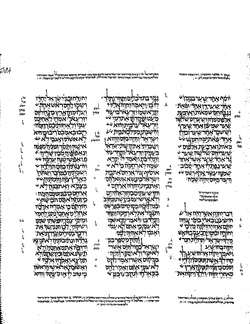Zephaniah 1
Zephaniah 1 is the first chapter of the Book of Zephaniah in the Hebrew Bible or the Old Testament of the Christian Bible.[1][2] This book contains the prophecies attributed to the prophet Zephaniah, and is a part of the Book of the Twelve Minor Prophets.[3][4] This chapter contains a call to penitence and oracles against nations, the editorial superscription and the exposition about the day of Yahweh's judgment against the Kingdom of Judah and Jerusalem.[5]
| Zephaniah 1 | |
|---|---|
 | |
| Book | Book of Zephaniah |
| Category | Nevi'im |
| Christian Bible part | Old Testament |
| Order in the Christian part | 36 |
Text
The original text was written in Hebrew language. This chapter is divided into 18 verses.
Textual witnesses
Some early manuscripts containing the text of this chapter in Hebrew are of the Masoretic Text tradition, which includes the Codex Cairensis (895), the Petersburg Codex of the Prophets (916), Aleppo Codex (10th century), Codex Leningradensis (1008).[6] Fragments containing parts of this chapter in Hebrew were found among the Dead Sea Scrolls, including 4Q77 (4QXIIb; 150–125 BCE) with extant verses 1–2, 18;[7][8][9] and Wadi Murabba'at Minor Prophets (Mur88; MurXIIProph; 75-100 CE) with extant verses 1, 11–18.[8][10]
There is also a translation into Koine Greek known as the Septuagint, made in the last few centuries BC. Extant ancient manuscripts of the Septuagint version include Codex Vaticanus (B; B; 4th century), Codex Sinaiticus (S; BHK: S; 4th century), Codex Alexandrinus (A; A; 5th century) and Codex Marchalianus (Q; Q; 6th century).[11] Some fragments containing parts of this chapter (a revision of the Septuagint) were found among the Dead Sea Scrolls, i.e., Naḥal Ḥever (8ḤevXIIgr; 1st century CE) with extant verses 1-6, 13-18[8][12]
Sub-Divisions
NKJV groups this chapter:
- Zephaniah 1:1 = Title
- Zephaniah 1:2-18 = The Great Day of the Lord
Editorial Superscription (1:1)
The superscription or title of the book places Zephaniah's ministry during the reign of King Josiah of Judah, and based on the content of his attacks against the religious syncretism of Judah, probably was active before Josiah's reform in 621 BCE.[13]
Verse 1
- The word of the Lord which came to Zephaniah the son of Cushi, the son of Gedaliah, the son of Amariah, the son of Hezekiah, in the days of Josiah the son of Amon, king of Judah.[14]
Cross reference: Ezra 2:2; Ezra 4:24; Ezra 5:1-3; Ezra 6:1; 1 Chronicles 6:15
- The name "Zephaniah" means "Jehovah hath guarded," literally, "hidden" (Psalm 27:5; Psalm 83:3).[15]
- "Hezekiah", consisting of the same letters with Hezekiah, king of Judah, and refers to that king, according to some scholars, including Jewish rabbi Aben Ezra.[16]
- "In the days of Josiah": refers to a period between 642 and 609 BC of Josiah's reign in Judah,[15]
The Day of Yahweh's Judgment against Judah and Jerusalem (1:2–18)
Verse 14

- The great day of the Lord is near;
- It is near and hastens quickly.
- The noise of the day of the Lord is bitter;
- There the mighty men shall cry out.[17]
- "Day of the Lord": the verses 14–16 becomes the basis of 'Dies Irae', a medieval hymn about the day of the Yahweh as a day of darkness and defeat, in the tradition of the Book of Amos and Isaiah.[5]
- "Noise" (or "voice") of the day of the Lord" refers to the day when Jehovah is ushering with a "roar of vengeance against the guilty" (Jeremiah 25:30; Amos 1:2).[15]
See also
- Baal
- Amon, king of Judah
- Hezekiah
- Jerusalem
- Josiah, king of Judah
- Milcom
- Zephaniah
- Related Bible parts: 2 Kings 22, 2 Chronicles 34, Micah 5
References
- Collins 2014.
- Hayes 2015.
- Metzger, Bruce M., et al. The Oxford Companion to the Bible. New York: Oxford University Press, 1993.
- Keck, Leander E. 1996. The New Interpreter's Bible: Volume: VII. Nashville: Abingdon.
- Mason 2007, p. 605.
- Würthwein 1995, pp. 35-37.
- Ulrich 2010, p. 616.
- Dead sea scrolls - Zephaniah
- Fitzmyer 2008, p. 38.
- Fitzmyer 2008, pp. 140-141.
- Würthwein 1995, pp. 73-74.
- Fitzmyer 2008, p. 127.
- Mason 2007, pp. 604–605.
- Zephaniah 1:1 NKJV
- Jamieson-Fausset-Brown Bible Commentary
- Gill, John. Exposition of the Entire Bible - Zephaniah 1:1.
- Zephaniah 1:14 NKJV
Sources
- Collins, John J. (2014). Introduction to the Hebrew Scriptures. Fortress Press. ISBN 9781451469233.CS1 maint: ref=harv (link)
- Fitzmyer, Joseph A. (2008). A Guide to the Dead Sea Scrolls and Related Literature. Grand Rapids, MI: William B. Eerdmans Publishing Company. ISBN 9780802862419.CS1 maint: ref=harv (link)
- Hayes, Christine (2015). Introduction to the Bible. Yale University Press. ISBN 0300188277.CS1 maint: ref=harv (link)
- Mason, Rex (2007). "35. Zephaniah". In Barton, John; Muddiman, John (eds.). The Oxford Bible Commentary (first (paperback) ed.). Oxford University Press. pp. 604–607. ISBN 978-0199277186. Retrieved February 6, 2019.
- Ulrich, Eugene, ed. (2010). The Biblical Qumran Scrolls: Transcriptions and Textual Variants. Brill.CS1 maint: ref=harv (link)
- Würthwein, Ernst (1995). The Text of the Old Testament. Translated by Rhodes, Erroll F. Grand Rapids, MI: Wm. B. Eerdmans. ISBN 0-8028-0788-7. Retrieved January 26, 2019.
External links
| Wikisource has original text related to this article: |
| Look up Zephaniah in Wiktionary, the free dictionary. |
- Jewish translations:
- Zephaniah (Judaica Press) translation with Rashi's commentary at Chabad.org
- Christian translations:
- Online Bible at GospelHall.org (ESV, KJV, Darby, American Standard Version, Bible in Basic English)
